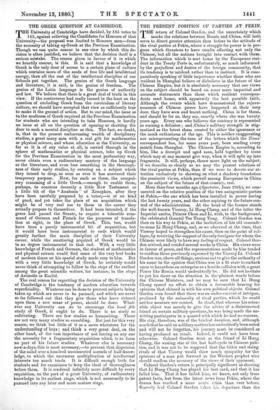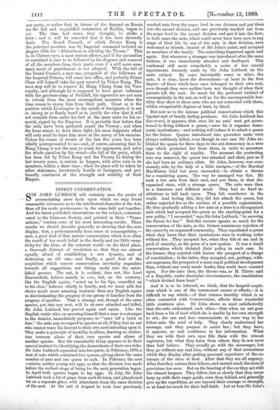THE PRESENT POSITION OF PARTIES AT PEKIN.
THE return of Colonel Gordon, and the uncertainty which marks the relations between Russia and China, will both serve to direct greater attention than before to the attitude of the rival parties at Pekin, where a struggle for power is in pro- gress which threatens to have results affecting not only the Chinese, but all the nations brought into contact with them. The information which is sent home by the Europeans resi- dent in the Treaty Ports is, unfortunately, so much influenced by the prejudices and desires of the foreign community, that its tendency is to mislead rather than to instruct. It is com- paratively speaking of little importance whether those who are resident in Shanghai believe or disbelieve in the future of the Chinese Empire, but it is absolutely necessary that our views on the subject should be based on some more impartial ana accurate statements than those which resident correspon- dents send home, with apparently the best possible faith. Although the events which have demonstrated the rejuve- nescence of Chinese power have happened at their very door, they have seen and learnt nothing. China is for them, and should be for us, they say, exactly where she was twenty years ago. Every one who believes the contrary is represented as nursing a delusion ; and .China's military strength is stig- matised as the latest sham created by either the ignorance or the mock enthusiasm of the age. This is neither exaggerating nor misrepresenting the tone of the letters which the Times' correspondent has, for some years past, been sending every month from Shanghai. The Chinese Empire is, according to him, like a decrepit and aged man, held together by irons which may at any moment give way, when it will split up into fragments. It will, perhaps, throw more light on the subject, if we describe as clearly as we may the present relations of the rival parties at Pekin, than if we were to devote our at- tention exclusively to showing on what a shadowy foundation the pessimist views, which prevail among Europeans in China on the subject of the future of that country, rest.
More than four months ago (Spectator, June 2Gth), we com- mented on the relative position of the two antagonistic parties at Pekin,—the one which has been installed in power during the last twenty years, and the•other aspiring to the future con- trol of the administration. At the head of the former stands the well-known Viceroy, Li Hung Chang, and of the latter the Imperial uncles, Princes Chun and Li, with, in the background, the celebrated General Tso Tsung Tang. Colonel Gordon was then on his way to Pekin, at the invitation of his old comrade- in-arms Li Hung Chang, and, as we observed at the time, that Viceroy hoped to strengthen his cause, then on the point of col- lapse, by receiving the support of the only foreigner for whom the Chinese were likely to have any feeling of respect. Colonel Gor- don arrived, and resided several weeks in China. His views were in favour of peace, and the representations made by him tended to confirm those previously expressed by the Viceroy Li. Colonel Gordon was, above all things, anxious not to give the authority of his name to the opinion that China was in a fit state to embark upon so hazardous an enterprise as a hostile collision with a great Power like Russia would undoubtedly be. He did not hesitate to put his views on the situation in the-plainest words before the Chinese Ministers, and we may be sure that Li Hung Chang spared no effort to obtain a favourable hearing for opinions that chimed in with his own political objects. Colonel Gordon soon found that there was an under-current of intrigue, produced by the animosity of rival parties, which he could neither measure nor control. In short, that whereas his osten- sible object was merely to give the advice of a disinterested friend on certain military questions, he was being made the un- witting participator in a quarrel with which he had no concern. His stay, therefore, was of the briefest duration, and, although much thathe said on military matters has undoubtedly been noted and will not be forgotten, his journey must be considered as having produced no result. Indeed, it could not have been otherwise. Colonel Gordon went as the friend of Li Hung Chang, the waning star of the last half-cycle in Chinese poli- tics, and it was not to be supposed that the bitter and rising rivals of that Viceroy would show much sympathy for the opinions of a man put forward as the Western prophet who should confirm the accuracy of the views of their opponent.
Colonel Gordon's return is principally significant as showing that Li Hung Chang has played his best card, and that it has failed him. That it has failed him, we know, not only from patent facts, but from the latest news from Pekin, where the drama has reached a more acute crisis than ever before. Scarcely had Colonel Gordon taken his departure than the war party, or rather that in favour of the demand on Russia for the full and unqualified restoration of Ktildja, began to act. The time had come, they thought, to strike a blow ; and it will be conceded that it has been shrewdly dealt. The Grand Council, of which Prince Kung is the principal member, was by Imperial command indicted on August 19th for " dilatoriness in advising the Throne." This is, in Chinese eyes, a most serious offence, and if the accusation be sustained is sure to be followed by the disgrace and removal of all the members from their posts, even if a still more sum- mary mode of punishment is not adopted. With the fall of the Grand Council, a new one, composed of the followers of the Imperial Princes, will come into office, and probably Prince Chun will himself take the post vacated by Prince Kung. The next step will be to remove Li Hung Chang from his Vice- royalty, and although Li is supposed to have great influence with the garrison-army of Pechihli, his opponents are not men to refrain from the most unscrupulous measures when the time comes to sweep him from their path. Great as is the position which Li occupies in the minds of foreigners; it is not so strong or so firmly based as to justify the view that it will not crumble from under his feet at the mere order for his re- moval, signed by the Emperor. It is probable that before this the coils have been gathered round the Viceroy ; and when the hour comes to draw them tight, his most desperate effort will only avail to leave him more at the mercy of his enemies. Unless the course of events of the last five years has been wholly misrepresented to us—and, of course, assuming that Li Hung Chang is not the man to crush his opponents, and solve the whole question by the sword—the fall of the party, which has been led by Prince Kung and the Viceroy Li during the last twenty years, is certain to happen, with utter ruin to its members, within a short time ; when its place will be taken by other statesmen, inveterately hostile to foreigners, and pro- foundly convinced of the strength and stability of their Empire.



































 Previous page
Previous page